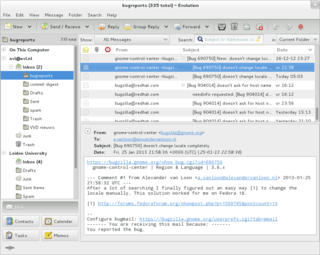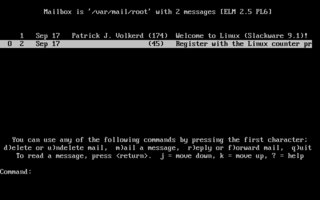
Electronic mail is a method of transmitting and receiving messages using electronic devices. It was conceived in the late–20th century as the digital version of, or counterpart to, mail. Email is a ubiquitous and very widely used communication medium; in current use, an email address is often treated as a basic and necessary part of many processes in business, commerce, government, education, entertainment, and other spheres of daily life in most countries.
In computing, the Internet Message Access Protocol (IMAP) is an Internet standard protocol used by email clients to retrieve email messages from a mail server over a TCP/IP connection. IMAP is defined by RFC 9051.
In computing, the Post Office Protocol (POP) is an application-layer Internet standard protocol used by e-mail clients to retrieve e-mail from a mail server. Today, POP version 3 (POP3) is the most commonly used version. Together with IMAP, it is one of the most common protocols for email retrieval.
The Simple Mail Transfer Protocol (SMTP) is an Internet standard communication protocol for electronic mail transmission. Mail servers and other message transfer agents use SMTP to send and receive mail messages. User-level email clients typically use SMTP only for sending messages to a mail server for relaying, and typically submit outgoing email to the mail server on port 587 or 465 per RFC 8314. For retrieving messages, IMAP is standard, but proprietary servers also often implement proprietary protocols, e.g., Exchange ActiveSync.

An email client, email reader or, more formally, message user agent (MUA) or mail user agent is a computer program used to access and manage a user's email.
Mbox is a generic term for a family of related file formats used for holding collections of email messages. It was first implemented in Fifth Edition Unix.

Apple Mail is an email client included by Apple Inc. with its operating systems macOS, iOS, iPadOS and watchOS. Apple Mail grew out of NeXTMail, which was originally developed by NeXT as part of its NeXTSTEP operating system, after Apple's acquisition of NeXT in 1997.

Pegasus Mail is a proprietary email client developed by David Harris. It was originally released in 1990 for internal and external mail on NetWare networks with MS-DOS and later Apple Macintosh clients. It was subsequently ported to Microsoft Windows, which is now the only platform actively supported. Previously freeware, Pegasus Mail is now donationware.

Balsa is a lightweight email client written in C for the GNOME desktop environment.

Kontact is a personal information manager and groupware software suite developed by KDE. It supports calendars, contacts, notes, to-do lists, news, and email. It offers a number of inter-changeable graphical UIs all built on top of a common core.
The Cyrus IMAP server is electronic mail server software developed by Carnegie Mellon University. It differs from other Internet Message Access Protocol (IMAP) server implementations in that it is generally intended to be run on sealed servers, where normal users cannot log in.
The following tables compare general and technical features of notable email client programs.

Dovecot is an open-source IMAP and POP3 server for Unix-like operating systems, written primarily with security in mind. Timo Sirainen originated Dovecot and first released it in July 2002. Dovecot developers primarily aim to produce a lightweight, fast and easy-to-set-up open-source email server.
The Internet Messaging Program or IMP is a webmail client. It can be used to access e-mail stored on an IMAP server. IMP is written in PHP and a component of the collaborative software suite Horde.
The UW IMAP server was the reference server implementation of the Internet Message Access Protocol. It was developed at the University of Washington by Mark Crispin and others.

Windows Live Mail was a freeware email client from Microsoft. It is the successor to Windows Mail in Windows Vista, which was the successor to Outlook Express in Windows XP and Windows 98. Windows Live Mail is designed to run on Windows 7 and Windows Server 2008 R2, but is also compatible with Windows 8 and Windows 10, even though Microsoft bundles a new email client, named Windows Mail, with the latter.

An e-mail agent is a program that is part of the e-mail infrastructure, from composition by sender, to transfer across the network, to viewing by recipient. The best-known are message user agents and message transfer agents, but finer divisions exist.

GroupWise is a messaging and collaboration platform from Micro Focus that supports email, calendaring, personal information management, instant messaging, and document management. The GroupWise platform consists of desktop client software, which is available for Windows,, and the server software, which is supported on Windows Server and Linux.
Invisible mail, also referred to as iMail, i-mail or Bote mail, is a method of exchanging digital messages from an author to one or more recipients in a secure and untraceable way. It is an open protocol and its java implementation (I2P-Bote) is free and open-source software, licensed under the GPLv3.

A text-based email client is an email client with its user interface being text-based, occupying a whole terminal screen. Other kind of email clients are GUI-based or Web-based, see Webmail.









